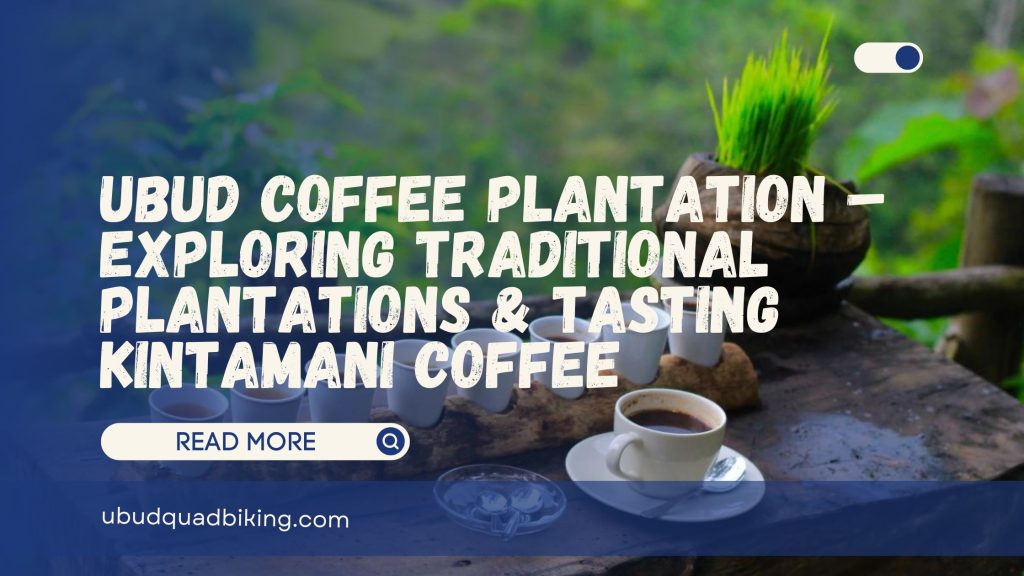Ubud Coffee Plantation is definitely worth a visit, especially if you are a coffee lover vacationing in Bali. Bali’s coffee plantations offer a relaxing atmosphere where you can learn how local farmers manage their coffee plantations, transforming them into some of the best-tasting coffee.
Here, we’ll provide you with an overview of Ubud Coffee Plantation and the experience you can expect. We’ll also give you an idea of the unique flavors of Balinese coffee to pique your interest in trying it.
Ubud Coffee Plantation
Ubud is a highland area in Bali filled with forests, plantations, and rice fields. When you hear this, you might imagine a typical rural area, but that’s not the case. Ubud is a tourist destination and the cultural heart of Bali. This place is rich in culture, arts, and tourism.
Because of this, Ubud has developed significantly and has become a popular destination for tourists seeking to enjoy the natural beauty of this tropical island. There are many ways to experience the island, whether you’re looking for a relaxing time, beautiful scenery, or thrilling adventures.
Ubud has several coffee plantations that have been transformed into tourist attractions. These plantations will teach you various aspects of coffee cultivation, types of coffee, and coffee bean processing. By turning these coffee plantations into tourist spots, the potential to introduce Bali’s unique coffee varieties increases. And, of course, you’ll have the chance to try them yourself.
Types of Coffee at Ubud Coffee Plantation
There are actually many types of Indonesian coffee available at Ubud Coffee Plantation for you to enjoy. Indonesia itself has various local coffee varieties, each with its own distinct flavor. However, we won’t be discussing all of them individually. Instead, we’ll focus on two types of coffee that are the flagship products at Ubud Coffee Plantation.
1. Kintamani Coffee

Kintamani Coffee is a well-known type of coffee from Bali and is a popular local variety. It is an Arabica coffee that grows in the highlands of Kintamani, Bali. This coffee has a unique flavor, as we all know that Arabica coffee generally has distinct flavor characteristics compared to other types of coffee. With a slight bitterness, it brings out the unique taste of each variety.
Kintamani coffee itself has a distinctive flavor; the type of coffee grown at Ubud Coffee Plantation features a fresh citrus taste with hints of chocolate, caramel, and brown sugar. This flavor profile is approachable to everyone because Kintamani coffee has low acidity and isn’t too bitter.
Some sources suggest that this flavor profile arises from the local Balinese tradition of planting coffee trees alongside orange trees. Bali is also a region known for its orange production. By planting these two crops close to each other, the flavor of Balinese coffee is influenced in this way.
2. Kopi Luwak

Ubud Coffee Plantation in Bali also introduces you to Kopi Luwak. Kopi Luwak is not a specific type of coffee, but rather a coffee bean processing method involving the Luwak, a type of wild civet, which can also be domesticated for certain purposes.
Why use animals to process coffee beans? Animals have an instinctual ability to select the best food. Certain animals only eat fruit that has naturally ripened, such as bats that eat mangoes; these animals choose mangoes that have fully ripened on the tree.
Similarly, the Luwak only selects the ripest, highest-quality coffee beans. This animal instinctively discerns the best quality beans and leaves behind the lower quality ones. The production process of Kopi Luwak utilizes this animal to select the best coffee beans, which the Luwak then eats. Since the Luwak’s digestive system cannot fully digest the hard coffee beans, they pass through its digestive tract intact.
The Luwak can peel the coffee beans in a way that humans cannot. Additionally, the animal’s digestive system ferments the coffee’s mucilage. Furthermore, this coffee is known for its high fat content, contributing to its rich flavor. This is what makes Kopi Luwak so enjoyable.
Afterward, the coffee is thoroughly cleaned, dried, and stored, ready to be enjoyed by coffee lovers. Kopi Luwak has a distinctive flavor, with a strong taste. In fact, Kopi Luwak is known as one of the most expensive coffees.
Traditional Bali Coffee Plantations
At Ubud Coffee Plantation, you can witness coffee being processed in a traditional manner. The coffee plantations in Bali indeed use traditional methods for processing their coffee. This approach is believed to preserve the quality and unique flavor of the coffee.
The coffee production process at Ubud Coffee Plantation begins with the careful selection of the best coffee beans for planting. These premium beans, chosen for their type and quality, are expected to yield high-quality coffee.
After harvesting, the coffee beans are peeled and cleaned. The harvested beans are then dried by being sun-dried. Once the drying process is complete, the beans are stored for a certain period. Afterward, the beans are ready to be sold as green beans.
Next, the coffee beans are roasted, either using roasting equipment or traditional methods. Traditional roasting is done by burning wood in a stove, and then roasting the coffee beans in a large clay pan, which releases the fragrant aroma of the beans.
Coffee brewing can also be done in various ways, either using equipment commonly found in coffee shops or through a traditional brewing method known as “tubruk.” In this method, the coffee is ground and then brewed by directly pouring hot water over it. Some people prefer this method as it is believed to bring out the full flavor of the coffee due to maximum extraction during the brewing process.
One of the unique aspects of Ubud Coffee Plantation is the local wisdom embedded in it. Here, local farmers still hold onto cultural values in coffee cultivation. The values passed down to the Balinese people include a philosophy of preservation. For this reason, the Balinese people continue to use local irrigation systems, organic fertilizers, avoid the use of pesticides, and utilize the land for planting multiple crops. This is why Bali’s coffee is known for being eco-friendly.
Enjoying an ATV Adventure and Exploring Ubud Coffee Plantation
If you wish to visit Ubud Coffee Plantation and experience an ATV adventure through forests with challenging trails, Ubud Quad Biking will provide you with that experience. Feel the thrill of navigating the enchanting Ubud forest on an off-road vehicle with challenging paths. You will be guided to discover and see various unique spots within the Ubud forest.
Afterward, you will be taken to visit the coffee plantation to see the vast coffee plantations in Bali, observe the traditional planting process, and savor the unique flavor of Balinese coffee. For more information, visit Ubud Quad Biking – Highlight Ubud Tour.
We have many complete packages for you to choose from. Please visit our tour packages page to find the various unique packages we offer. Contact us through the details below for more information.

